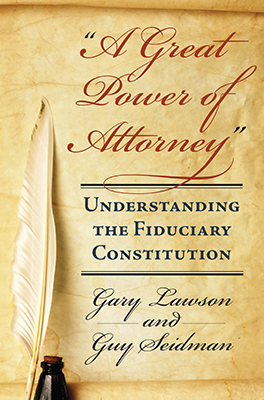Professor Gary Lawson Proposes Constitution as Fiduciary Instrument with New Book
A Great Power of Attorney: Understanding the Fiduciary Constitution interprets how the Constitution grants limited powers to national government.
 Suppose, for a moment, that it is the late eighteenth century. Beyond person-to-person interaction, there are no methods of immediate communication or rapid modes of transportation, but matters of personal and financial life still need to be addressed.
Suppose, for a moment, that it is the late eighteenth century. Beyond person-to-person interaction, there are no methods of immediate communication or rapid modes of transportation, but matters of personal and financial life still need to be addressed.
When family and business affairs extended beyond the immediate local area, one might wish to execute a letter—or power—of attorney, granting another individual power to act on behalf of a party.
Letters of attorney in that era generally shared a common structure, designating the identity of the granting party, the identity of the acting party, the specific powers conveyed, and often the purposes for the grant in a length preamble.
These fiduciary instruments weren’t uncommon for their time. But even as the roles of some representative parties (such as stewards of manors) have vanished in over two hundred years of advancement in communication and transportation, one particularly famous eighteenth-century document still maintains the form and structure of a power of attorney: the Constitution.
So argue Philip S. Beck Professor of Law Gary Lawson and coauthor Guy Seidman, Interdisciplinary Center Herzliya Israel Professor of Law, in their latest book, “A Great Power of Attorney”: Understanding the Fiduciary Constitution.
Lawson and Seidman consider the Constitution’s grants of “limited powers to the national government” and explore the implications of interpreting those powers in the context of a fiduciary Constitution.
In the new work, which was published earlier this year, the authors reject a myriad of characterizations of the Constitution, including that of an “instruction manual,” which they had previously suggested in earlier works.
“Some . . . descriptions are closer to the mark than others, but none accurately situates the Constitution within the universe of documents known to eighteenth-century makers of legal instruments,” they write in the first chapter.
According to Lawson and Seidman, the Constitution has the “form, function, and feel of an agency instrument,” with the attributes, duties and limitations of the actors laid out much as one would expect to see in a fiduciary document.
 A Great Power of Attorney “takes an approach to understanding the United States Constitution that would not have been startling or interesting 200 years ago but that has been lost,” Lawson says.
A Great Power of Attorney “takes an approach to understanding the United States Constitution that would not have been startling or interesting 200 years ago but that has been lost,” Lawson says.
This new (or very old, depending on how one looks at it) approach to the Constitution as a fiduciary document was largely inspired by the work of constitutional scholar Robert G. Natelson, with whom Lawson and Seidman have sometimes collaborated.
Lawson cites Natelson as an “unindicted coauthor” of the book for his influence on their research and consideration of the Constitution as a fiduciary document.
After reading some of Natelson’s works, Lawson says that he and Seidman decided their approaches “needed to be harmonized,” which began their collaboration.
“Natelson is the one who found [the fiduciary interpretation of the Constitution],” Lawson says. “He has dug up all sorts of things that no one else bothers to look for.”
A Great Power of Attorney is a “generalization and extension” of the ideas brought forth in The Origins of the Necessary and Proper Clause, a book the three published with Geoffrey Miller of the New York University School of Law in 2010. Lawson, Seidman and Natelson have also coauthored several articles.
Lawson notes that that their new book fleshes out Natelson’s insights. “We don’t want to take credit for the rediscovery,” he says, noting that the “rediscovery” illuminates a “very fundamental” contextualization of the document that has only been understood within the last decade.
The exploration of those insights includes a dive into the categorization and definition of the Constitution—and the importance for interpretation of understanding these categorizations of the document.
The categorization of the Constitution as a fiduciary instrument has the potential to offer a collection of “background rules” for interpretation of the document.
“Knowing what kind of document you’re reading tells you what to look for, what not to look for, what to expect, what not to expect, and how to deal with various kinds of ambiguities—how to fill in holes that are going to appear in any text,” Lawson says. “We think this is a really big deal.”
Reported by Kaya Williams (COM’20)
Related News
- Professor Gary Lawson Provides a Toolkit for Proving the Law with New Book
- Two BU Law Professors Receive Boston University’s Highest Awards for Teaching
- Tamar Frankel to Receive Ruth Bader Ginsburg Lifetime Achievement Award
- Michael C. Harper Testifies before the US House Committee on Education and the Workforce